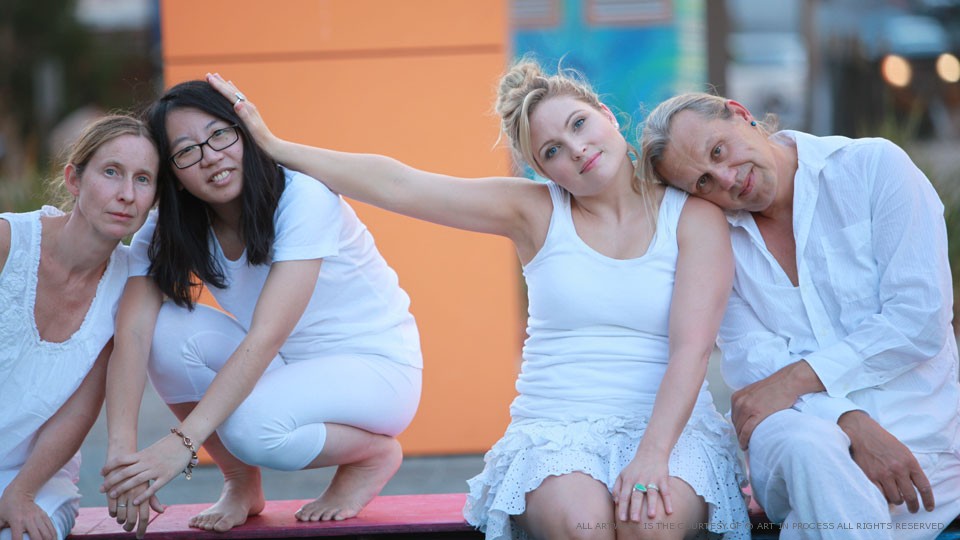PICA (Perth Institute of Contemporary Arts) residency 2015
THE PREVENTION: LOCATING MODERN IDENTITY with a Temporary Ensemble Working on a creative process in the studio and in some of Perth’s public locations, for further development of the Existence Theatre practice during a residency at PICA from 16 February to 8 April 2015
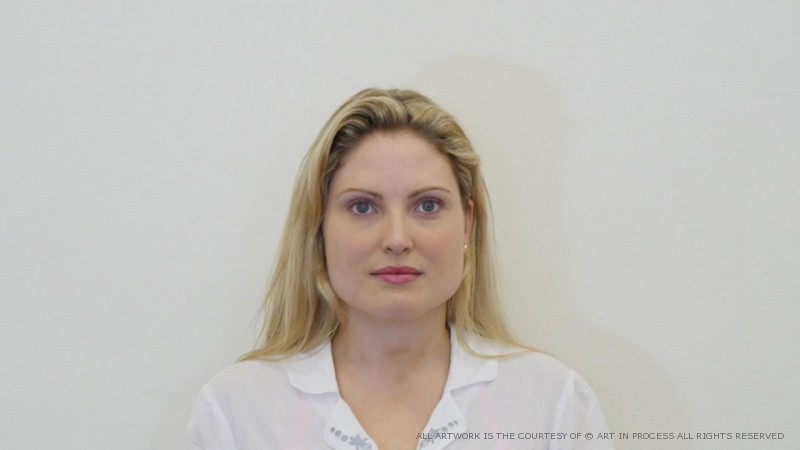
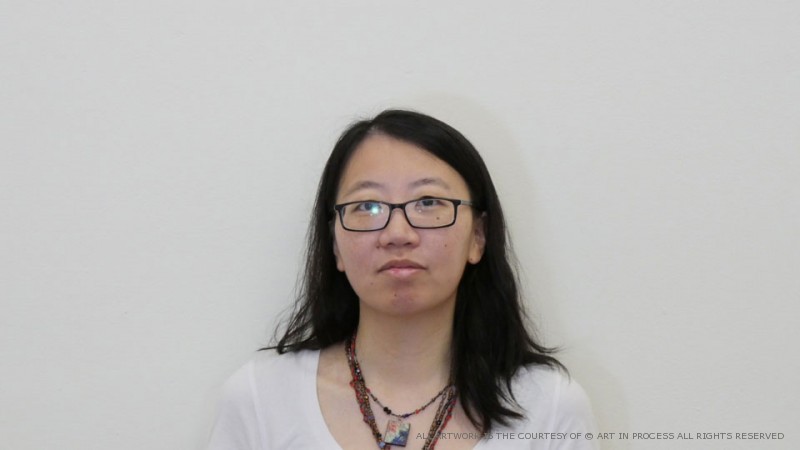
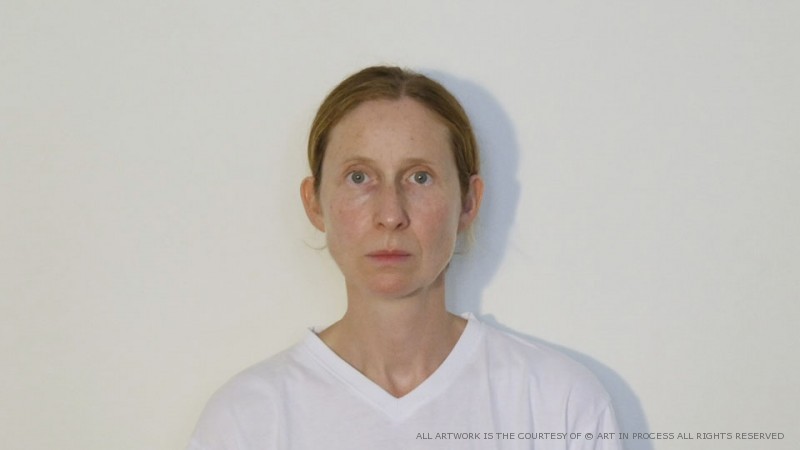
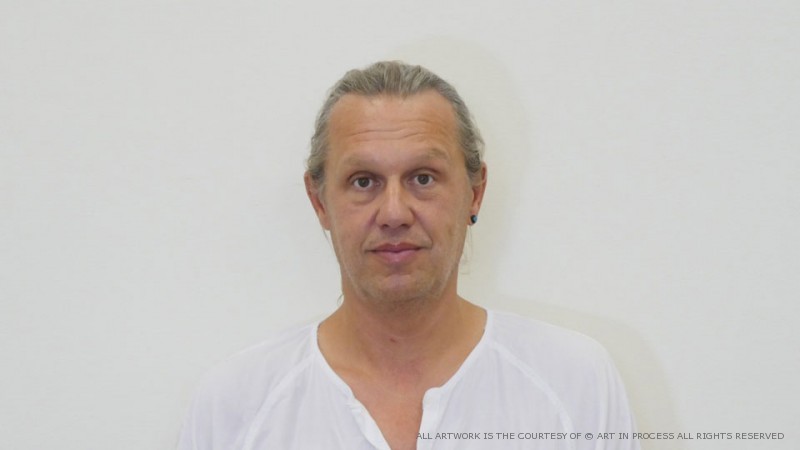
WORK PROCESS | PERFORMANCE TEXT | PHOTOS | VIDEOS | Existence Theatre of ART IN PROCESS
WORK PROCESS
This project has been supported by a PICA studio residency, involving Emily Rose Brennan (Performance) and Cissi Tsang (Performance and Sound).
Various open performance sessions for people to attend and get involved during a two-months period. An Endperformance at the Open Studio Night on 31 March gave a final insight into the process. One of the resulting video installations was shown on the PICA SCREEN outside PICA.
Performative Situation:
Enter a space of movement, voices/sound and objects of constantly changing situations, and receive different “insights” into an experimental process.
Have an “existential experience”, when boundaries between performers and audiences merge:
Get to know the foreign aspects in yourself. What happens, if you move towards the other(s) in open, experimental ways? When you interrupt, intrude, … their personal environment?
Four individuals are caught up in a world of signs, rules, torn between obeying, functioning and looking for their individuality. Driven by fear to face their own human nature, they tend to hold on to doctrines they were brought up with, memorising them at intervals. But in questioning their own human existence, they drift away into a trance-like state of surreality.
Context:
In the realm of the EXISTENCE THEATRE practice under analytic terms (combining video, installation, performance art and creative writing), this project focused again on transcultural issues, against racism, observing meanings of belonging and links between technology and the human body. Based on a short performance text (simultaneously performed in English and German), the experimental exploration used movement and voice in relation to a positive and individual perception of space and time through our own transcultural existence.
PERFORMANCE TEXT
THE PREVENTION by bello benischauer
This performance text is to reflect on the meaning of existence and transcultural society and how we tend to forget – in the urge to function – that there still exists some other reason for life, which is not ruled by human power, greed and exploitation. In creating space and time for reflection we open our minds…
A retained existence… protected by existential provisions. To do… what we would rather like to prevent… let out emotions… that have no home anymore… Provisions that are no provisions at all… we people design this ourselves… constrain ourselves… close our mind to the things that surround us… marginalise… oppress each other. We people do that ourselves… accept cultural constraints… so that we don’t attract unwanted attention… accept religious compulsions… Only because we cannot separate dependency from mastering a self-discipline. Granting other people some latitude… starts with oneself. A sense of openness for other religions… and opinions… starts with oneself. Protection… through a law… only because of feeling uneasy… out of fear… to do something wrong. Only a part… of own life expectancy… can be influenced by oneself. Just self-discipline would get us any further… to feel free… and towards the others… only to be in harmony with inner peace… shows us the way. Purity of the sinner… true justice is the purpose in life… we think… When everything failed… because of all the lies of a materialistic… new world. A cloned human performer is brought to justice… has to function… perform… must act the right way… to be respectful… what society asks for… this is what counts and this is what we have to comply with. This is also how to avoid conflicts… because of disturbances… this is to avoid contact to preternatural emotions… Functioning trade… in the fossil rich world. Energies taken… to help oneself… and others. Only a tang of glory… only a glimmer of irrationality… but longing a bit for tomorrow… Only a piece of misconduct… just a one-off into the black… just one glimpse… Too much… already enough… Is yet… was yet… gains something from structural irrationality… leads to total control… and dependency. A drive through a hilly countryside… which means life… The worst isn’t only within yourself but within myself as well. Gone… Where? If the tomorrow doesn’t exist anymore? In a world… in which we want to avoid everything… Control everything… And prohibit everything… Only the human being itself… fears… to taste… the blossoms of life. This way one tries to draw away… to prevent… to deal… with one’s own reticence… and one’s conservatism.
What is a cynic? A man who knows the price of everything and the value of nothing. (Oscar Wilde)
The human being is guided by materialistic things… instead of quality values. This is why everything can be controlled by a price. It means that spiritual emotions have to be observed neutrally… and have no use on any level of consciousness… Racism and rejection… War and power… Greed and gold… Light of the eternal fire… burns within… The urge to eliminate… originates from fear… Life… to feel it with body, soul and mind. If I attempt to avoid all that… I only manage to withstand… but not the life… with its uncontrollable… old… fossil rich… values.
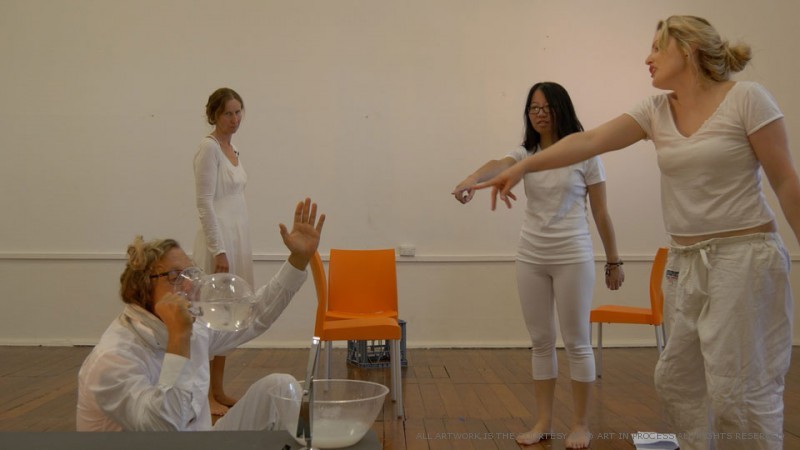
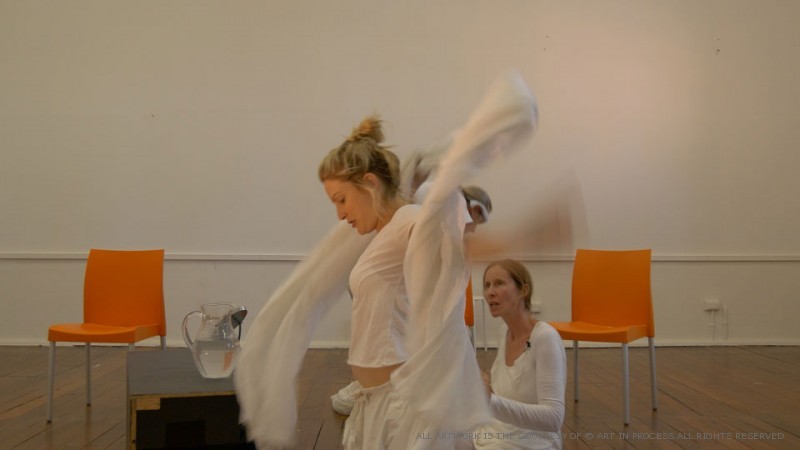
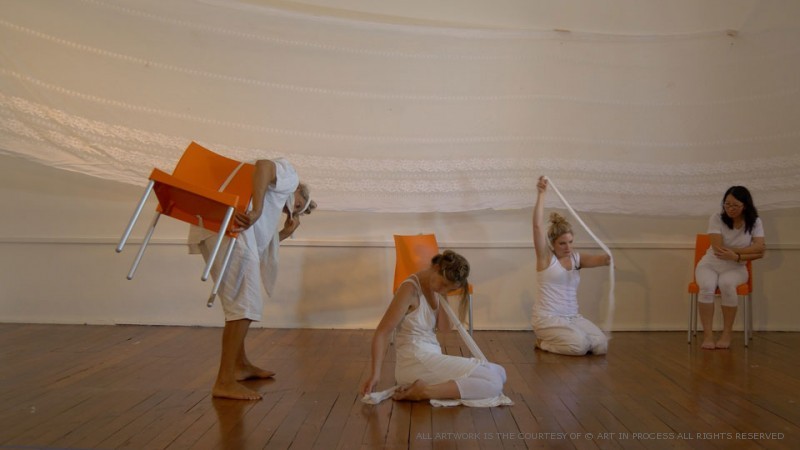
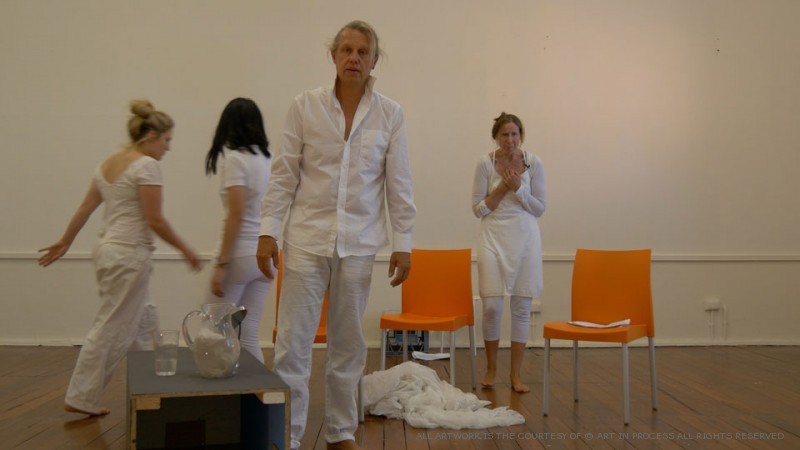
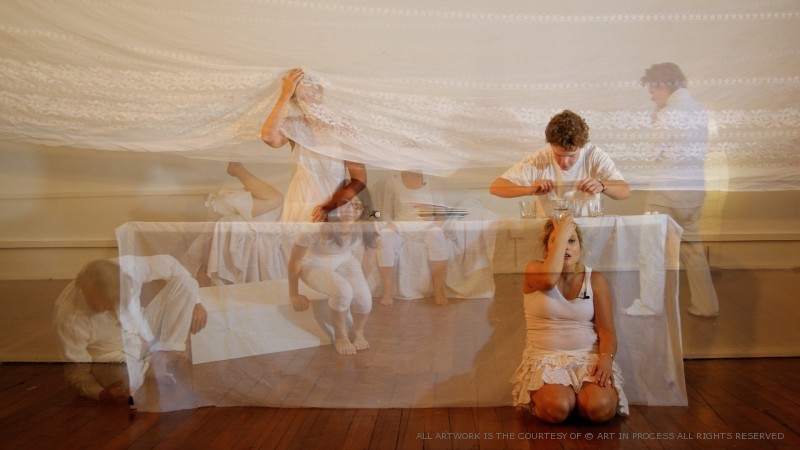
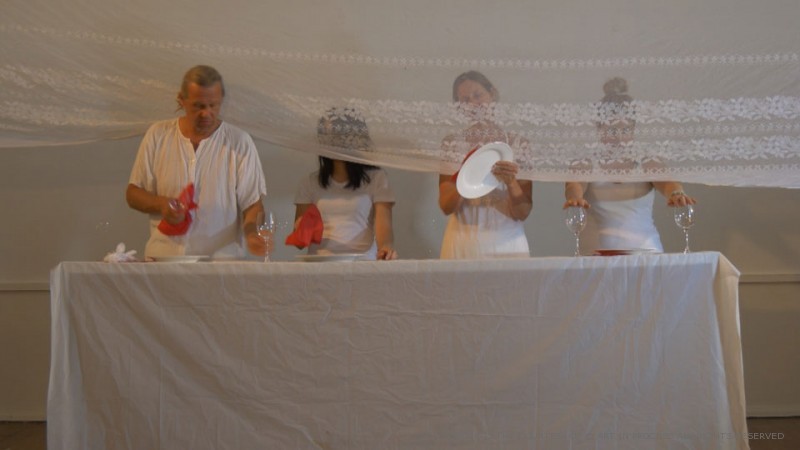
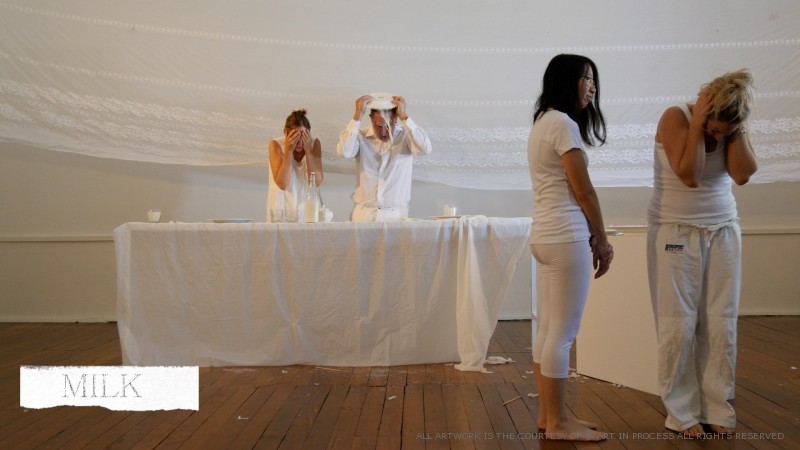
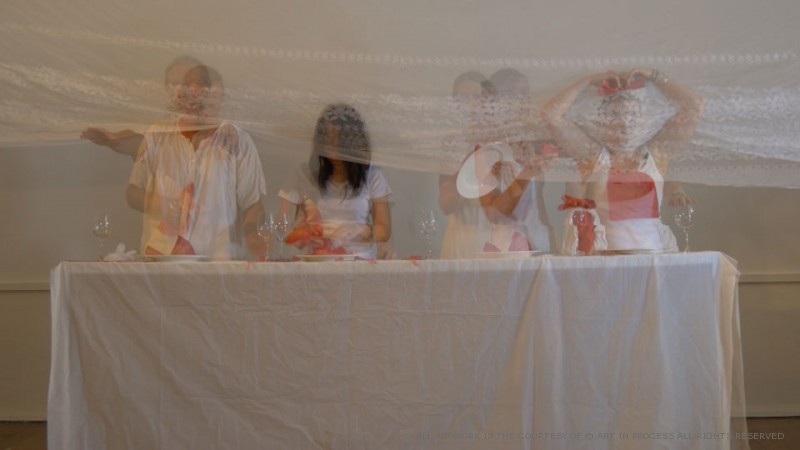
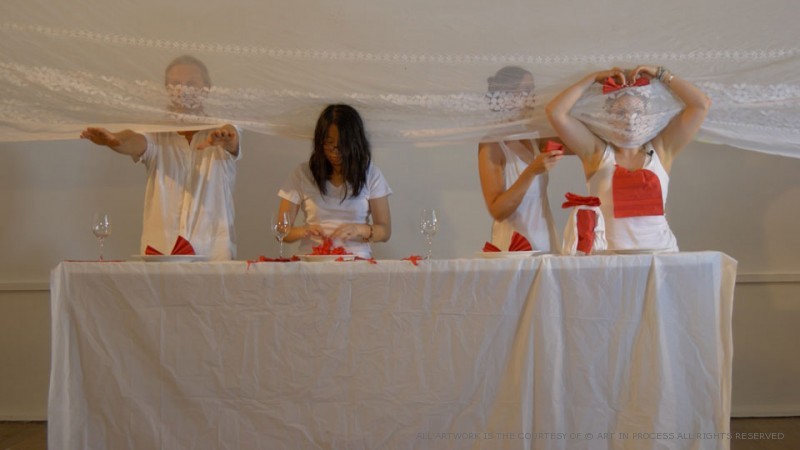
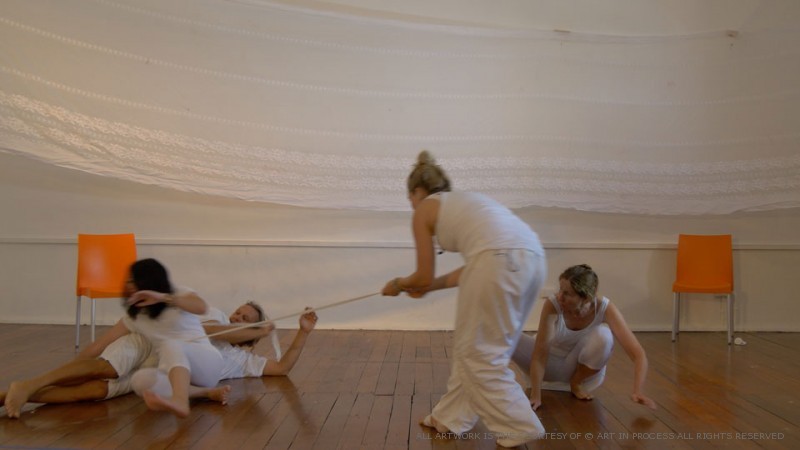
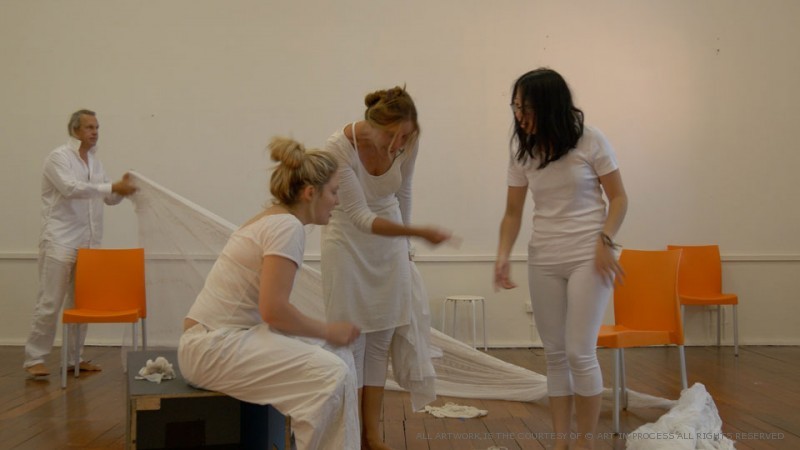
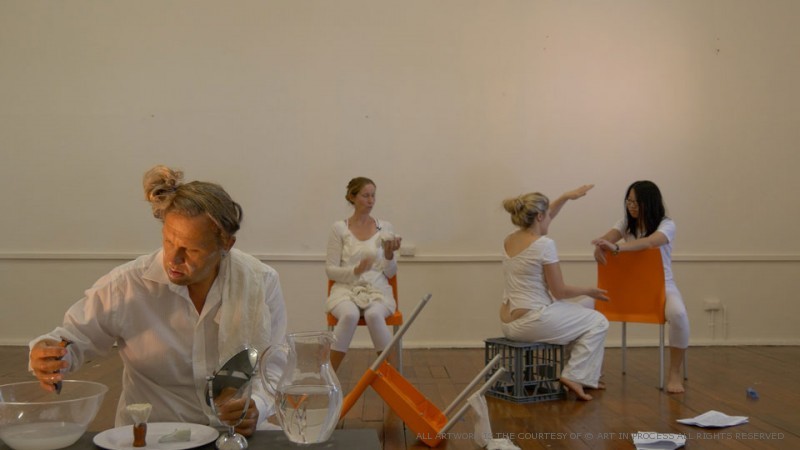
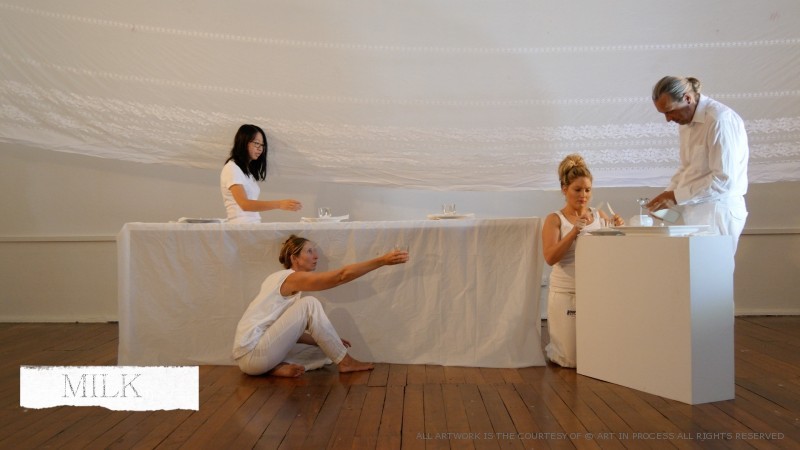
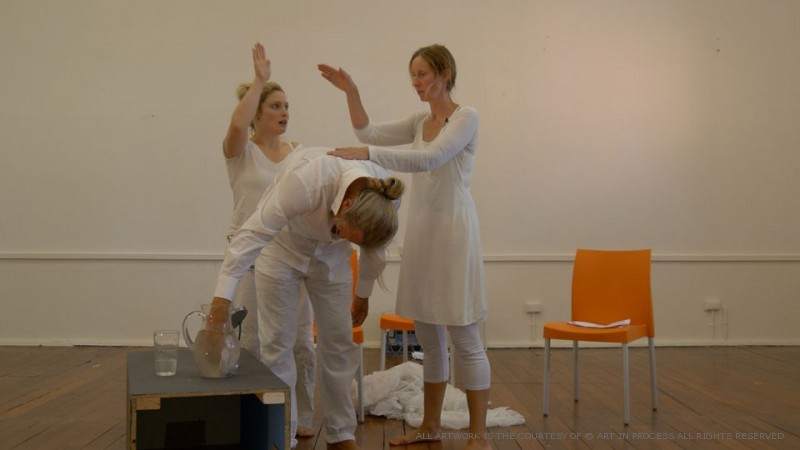
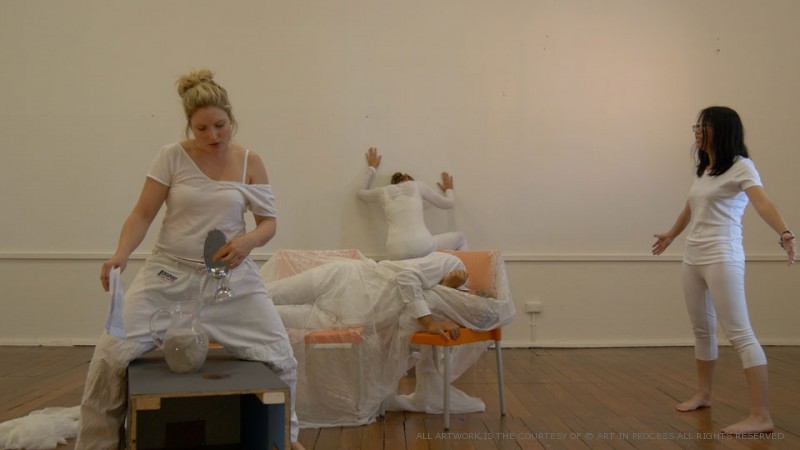
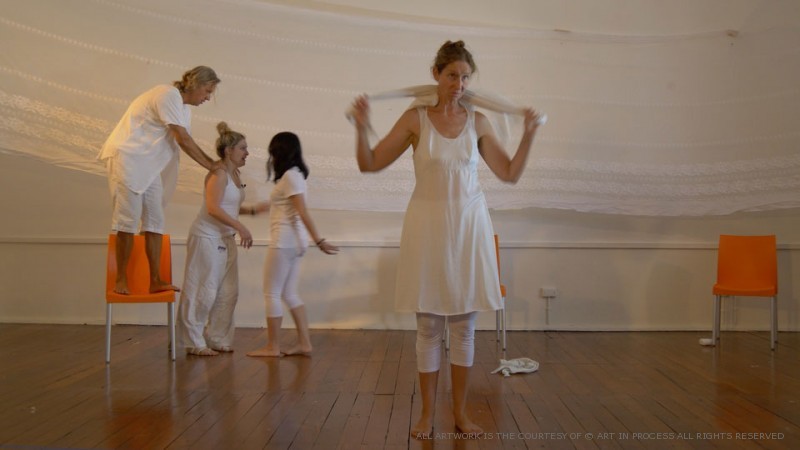
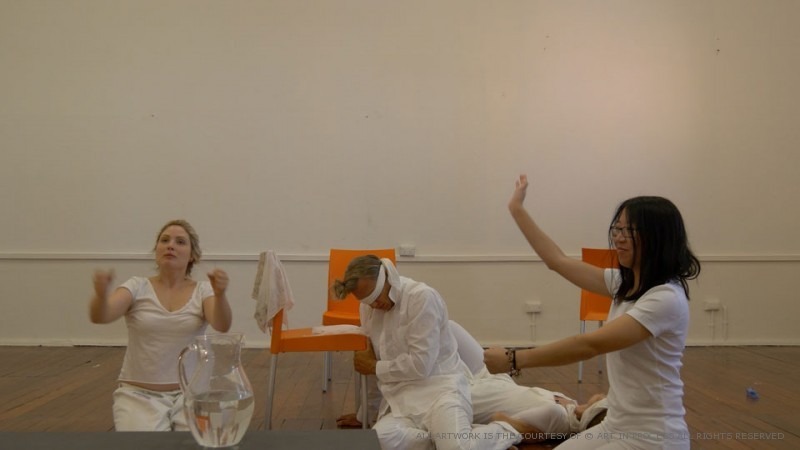
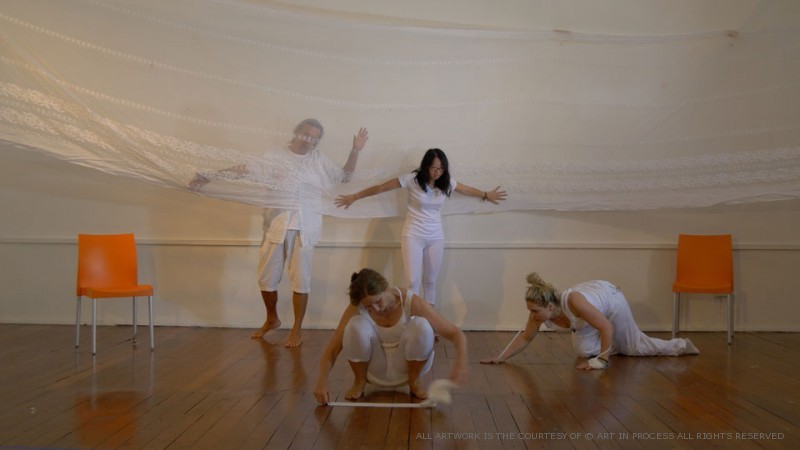
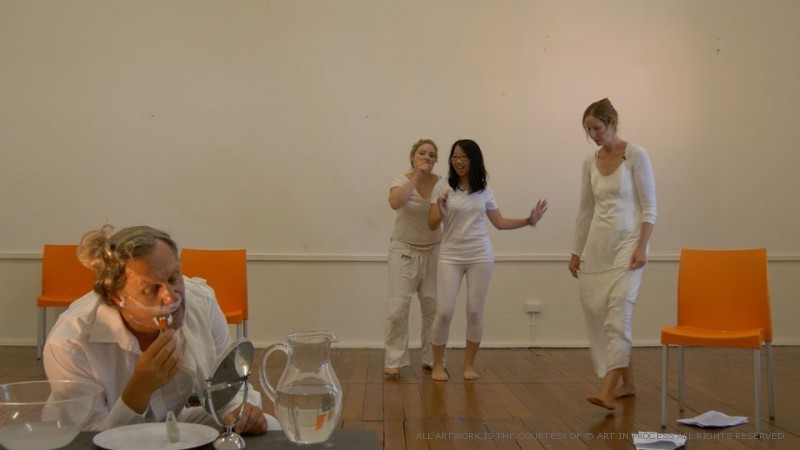
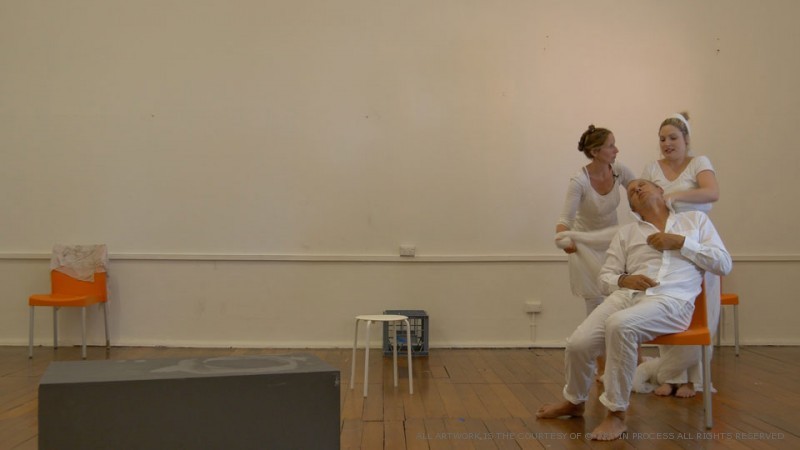
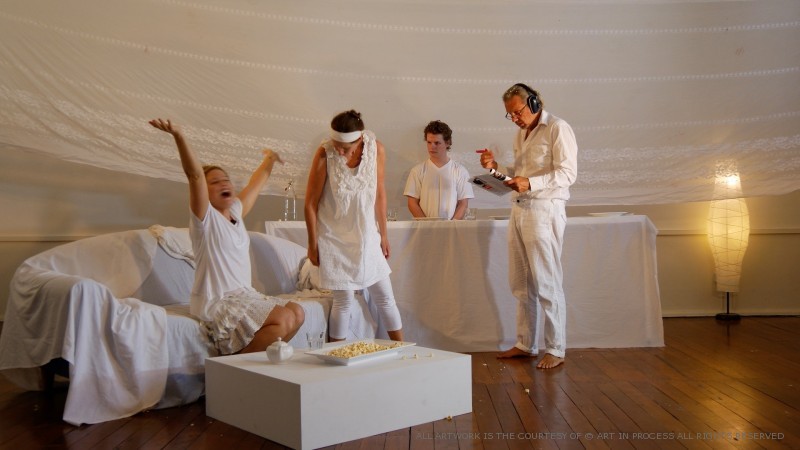
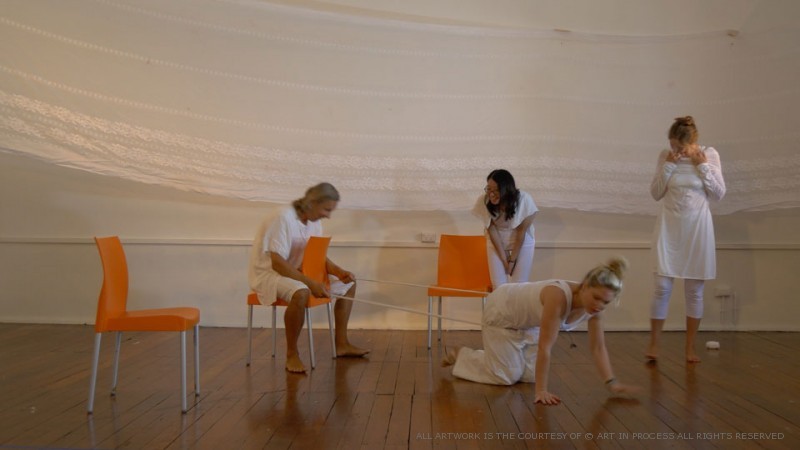
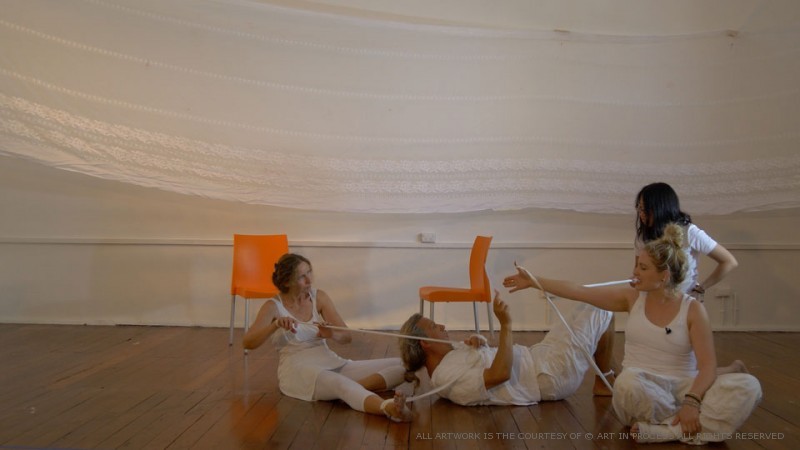
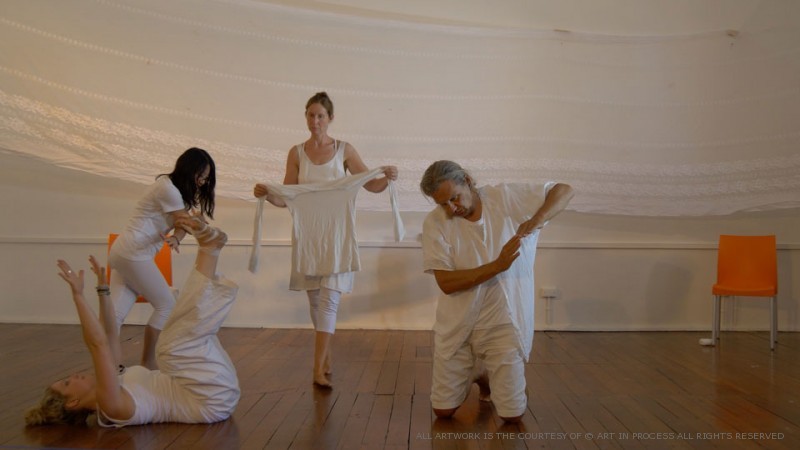
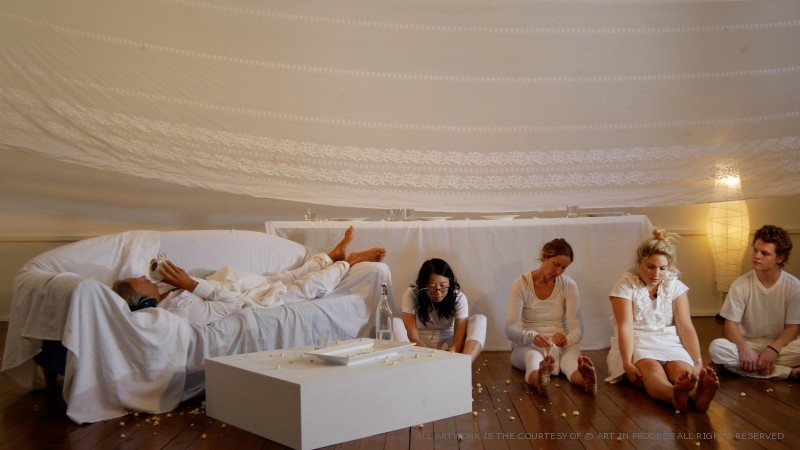
Existence Theatre of ART IN PROCESS
EXISTENCE THEATRE of ART IN PROCESS
TEXT. CORPOREALITY. LOCATION.
bello benischauer (Artistic Development) elisabeth m eitelberger (Theory and Artistic Involvement)
The EXISTENCE THEATRE… in its developmental stage… and how transnational identity can be artistically experienced/interpreted/ communicated.
(These philosophical notes in English are a translation from the original German version)
update 13.08.2014
How do people (of global societies) engage with their selves, their being and which insight do they get into the term transcultural identity* within different living environments and from a present-day perspective? ART IN PROCESS creates a Temporary Ensemble for each project, with which they initiate a process by combining corporal movement, voice and using different languages to confront the individual (within the group and in relation to an audience) in an unconcealed manner with one’s own self, “the other” and the in-between, based on a self-written performance text.
The didactic intention is to shift the emphasis towards an artistic, performative conflation of different media within a process-orientated improvisation whereby lecturing and learning aspects give way to actually creating space – while using a particular performance text (written for the particular situation/location) – to reveal and explore something together and within one’s self that goes beyond the learned knowledge.
What do we explore ourselves performatively and how do we communicate it further, when we initially do not engage within the Existence Theatre to confirm something already thought, but to expose ourselves to the unknown and to face this unknown permanently within the process that has yet to be created?
Within the Existence Theatre we produce artistic and multidisciplinary processes, into which we invite audiences to have an insight. With the term insight we would like to move away from the term presentation, because we invite the audience to have their own individual and existential experience within the process, as far as it proves approachable.
TO LIVE IN THE PRESENT:
_ artistically explored – multidisciplinary construed: Performance Text. Temporary Ensemble. Location of Process _
cultural variety and encounter/face the others through the EXISTENCE THEATRE, which strongly attempts to approach the others face-to-face as frankly as possible
We are “shaped” by the past. Trying for political correctness often results in socially inhibited interactions. We react timidly and a move towards the others, in an uncomplicated way, seems impossible. We are often unaware of this habit. In the end this seriousness destroys any attempt to react openly and to proverbially embrace “the others”.
bello benischauer, on who’s ideas the Existence Theatre is based and who constantly develops it further, spent more than ten years with the exploration of different living environments by trying to empathise with different communities in countries like South- and Central America, Pakistan, Iran, Nepal, South- and Eastafrica, Indonesia, New Zealand, India and parts of Europe, before settling again in Austria as well as in Australia for having two base stations.
He demonstrates a sociably deep connection to the various cultures while making their individual importance visible and by placing them next to each other in his work. With his artistic practice, like with his everyday communication, one finds him approaching people most freely (away from social or cultural judgements).
With the Existence Theatre he initiates unbiased situations, to “create space” on different levels.
Boundaries blend, barriers get broken through and other things are aimed at exploring the changes that occur, that something gets born, that something new is meant to be, which initiates a completely different way of seeing things.
What is it that we expect from “the others”? How do we judge them? And which criteria do we use to create a new reality (based on which cultural patterns that we base them on), which we experience/perceive as real? What happens, if we draw away from the social circles that we know best, to confront ourselves with the foreign people? Which of our educated and through socio-cultural backgrounds shaped behaviour patterns/habits get suddenly apparent and we therefore consciously aware of them?
Which are the prejudices we succumb to? Which advantages do we use within our familiar surroundings and how does this work in foreign places?
Which privileges do we appreciate and which of these privileges can’t we use for ourselves? Here and elsewhere? Do we have expectations through a certain social status, from which we expect others to acknowledge them accordingly? Or are we ourselves in the position to feel obliged to fulfil the expectations of others?
What happens if we bare all of societal status and try as a human being to face another, confronting ourselves with the other self and not until then with the own self? What does individuality actually mean within our global system? Which roles do we play and what do they mean? Cross-culturally? Transgressively? Or just on different societal levels?
The idea of self-contained structures and the aim to place and categorise everything rightly gets shaken by the ever expanding and complex mixing of cultures, and all of a sudden this idea doesn’t work anymore. Where does it lead us, when old structures/habits do not cause the desired reaction anymore? When cultural traditions, taken out of their context, lose their power?
When the symbolisation of the individual languages fade through the use of a Lingua Franca for general communication and we neglect to realise phonetic specifics and therefore social and cultural significance of language as such… Then capitalism starts to rule… and globally existing racism, because racism is certainly a reaction of the fear that one must share = lose something or out of the compulsion to open up to “the other”, out of the lack of understanding, out of wrong claims, which simply rule out the ethical laws of being human, and because within racism one believes that if something mingles, the own self would necessarily get lost. And racism simply rules out the foreign, “the other”, the uncommon, which does not match own (defined or imagined) standards.
It is a power, which finds a matrix in all the people, if the right buttons get pushed. This is where nothing can develop any further, can’t reshape or change. But this is also where nothing can be kept or integrated, because this is where stagnation rules, the opinionated, finally something powerful, which is – in a universal sense – powerless at least. Why and out of which motifs would people today want to keep away from the changes that occur in our world? How is it possible to acknowledge only the negative and to draw away from the wonderful multi- coloured and diverse human kind and to fear it that strongly?
But we can try to explore the self and the other self. Without any masks, naked we face the other, meet each other, confront ourselves with the unknown, what we did not already think or can plan ahead and start a communication on a completely different, invisible level. Once we have reached this state something can develop. We take the time to face the other as a human being. We take the time to learn to understand.
Which role we occupy in life or in which role we grow into, depends on various facts. Still there is, banality or not, something that connects all the human beings. In our fast times many people search for orientation points, they are after the meaning of existence, after the self. Artistic processes can help to open/extend/change one’s mind.
With the Existence Theatre we create time and space to confront us/a temporary ensemble with ourselves and also to give the audience the chance to integrate themselves into the process. The
ensemble works together on the creation of open spaces, which are brought to the audience’s attention and which mean to create space for an insight into an existential experience. Let us create a fresh reality, in which we are open to draw away from the foreign, which isn’t foreign any more because we have started to get to know it already and it isn’t foreign anymore because of that… Then we can create a new realness and with it connected reality for a transcultural society, in which racism and other patronising trends of religious, cultural, political and/or social nature have no place and we must necessarily overcome them.
* Wolfgang Welsch (German Philosopher) wrote about the Transcultural Society (1997) in context to the urgency, to understand different cultures not as singularly next to each other existing but instead as interweaving “systems” to prevent conflicts. In his essay he writes that the term transculturality differs quite strongly from the ones of multiculturalism and interculturalism, as we should not support self- contained systems side by side but rather recognise that cultures would not exist in isolation from each other and that every culture would be hybrid. Welsch then states that each individual has its own inner transculturality. But to be able to face the foreign sincerely, we must realise that our identity is mostly based on foreign elements and not until we start realising this, we could recognise the similarities to the/our utter foreignness. Today we would learn more about other cultures, their customs and morals in one single day, then it was possible during weeks or months in earlier days. This also means that we do not have an uniform image of identity but that every individual has its own, individually different transculturality.
